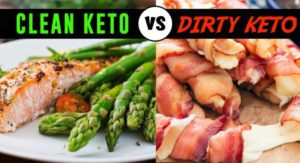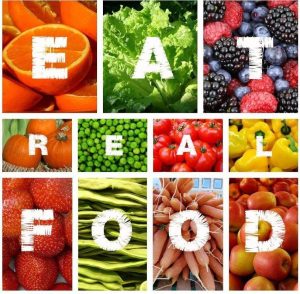The Pros And Cons Of The Keto Diet
They say their sugar cravings are gone, they no longer have “brain fog” and they are losing 3-5 pounds per week. All because they are “going keto.”
Is it too good to be true?
What is “keto?”
 The ketogenic diet is a very high fat, low carb eating plan where EVERYTHING sweet and starchy is avoided. You got it — this means no cake, candy, cookies, soda, juice, sweet tea, lemonade, pizza, pasta, rice, potatoes, corn, popcorn, chips, bread, sandwiches, crackers, most fruit, sweet dressings, even ketchup! Instead, you eat lots of nuts, avocados, oils, butter and ghee, along with modest meat, chicken, pork or fish, and a few fruits and vegetables (not too many, because they have carbs).
The ketogenic diet is a very high fat, low carb eating plan where EVERYTHING sweet and starchy is avoided. You got it — this means no cake, candy, cookies, soda, juice, sweet tea, lemonade, pizza, pasta, rice, potatoes, corn, popcorn, chips, bread, sandwiches, crackers, most fruit, sweet dressings, even ketchup! Instead, you eat lots of nuts, avocados, oils, butter and ghee, along with modest meat, chicken, pork or fish, and a few fruits and vegetables (not too many, because they have carbs).
And, by following this diet perfectly, your reward is a metabolic state called ketosis, where the body burns fat instead of carbs for fuel. In ketosis, the liver makes ketones, which are (controversially) touted as the preferred fuel, turning you into a “fat-burning machine.” WOW! Sounds amazing, doesn’t it?!
Is ketosis really where the magic occurs?
Science does show there’s a slight caloric benefit to “being in ketosis.” During this state, calories sneak out of the body unused via breath and sweat. But, in reality, they only total about 45 calories per day. You may be thinking…that’s not a lot of benefit for a whole lot of dietary deprivation! In fact, this video by Dr. Michael Greger of NutritionFacts.org reviews the science, and suggests that the ketogenic metabolic advantage has been “falsified.”
How do people lose weight so quickly on the keto diet?
There are two mechanisms:
- The keto diet is actually a low-calorie diet. Many keto dieters average around 1,400 calories a day according to dietary analysis. (The average daily caloric intake to maintain weight is 2,000 calories for women and 2,500 for men.) Thanks to the extra fat burning promised by ketosis, there’s high motivation to say “no” to everything sweet and starchy like never before, resulting in restricted caloric intake. Additionally, eating lots of fat means satiation kicks in so you don’t eat as much.
- Water loss. When carbs are restricted, glycogen stores in the muscle are reduced. Glycogen is responsible for water retention, so when glycogen levels fall, so do water levels, resulting in a significant loss of water weight.
 What is “clean keto” vs “dirty keto?”
What is “clean keto” vs “dirty keto?”
“Clean keto” is avocados, grass-fed beef, and wild salmon.
“Dirty keto” is diet jello, cool whip, and fast food without the bun. These are foods that even keto dieters admit “aren’t good for you.” But, since the diet is SO incredibly restrictive, the internet is flooded with these cheat foods for staying in ketosis.
Is “keto” a high protein diet?
As with the Atkins diet, you’re advised to eat a high-fat diet without eating too much protein. Too much protein allows the body to go into gluconeogenesis (the making of glucose), which kicks a person out of ketosis. Excessive protein is also hard on the kidneys. However, a plate of fat is hard to eat, so it’s not uncommon for people to eat too much protein on the keto diet.
Is ketosis safe?
Ketosis in and of itself is thought to be safe. But the nutritional consequences of what is required to be in ketosis is an entirely different story (as you’ll see in the CONS of keto below).
What’s my bottom line?
Weight loss by any method can improve your numbers and make you feel better in the short term. However, the science indicates that the keto diet can be risky for the heart, prostate, colon, diabetes and microbiome. Even if you want to take the risk and bet that it’s healthy, it’s a lifestyle that’s extremely tough to sustain long term, or enjoy as a family.
 What if you instead hang onto all that is good about keto (ending your sugar cravings and keeping overall carb intake relatively low), and add back the nutrients you need with a few strategically chosen good-for-you carbs?
What if you instead hang onto all that is good about keto (ending your sugar cravings and keeping overall carb intake relatively low), and add back the nutrients you need with a few strategically chosen good-for-you carbs?
Well, this is exactly what the 8 DIET FREE Habits step you into doing! Eating delicious REAL food, without giving up entire food groups, while seeing your sugar cravings vanish, and feeding your microbiome perfectly. You also lose your cravings for fried foods and anything “processed” (unlike “dirty keto” dieters).
Truth be known, a DIET FREE lifestyle focused on REAL food is actually “low sugar and low carb” (compared to the Standard American Diet). It is achieved without any “macros” counting and your whole family will enjoy and benefit for a lifetime. Even though initial weight loss may not be as rapid (without the water weight loss advantage), studies show after one year, the weight loss is the same!
Are You Ready To Get Healthy The DIET FREE Way?
With Zonya’s Eight DIET FREE Habits, you’ll lose weight and improve your health through sensible nutrition and exercise. And with a focus on one habit at a time, you’ll be able to set yourself up for a life time of success. Change your life with this guilt-free, DIET FREE approach!

 added sugar EVERY DAY. Learning to avoid added sugar and say “no thank you” to the frequent offers of birthday cake, candy and more, is truly a great “muscle” to flex!
added sugar EVERY DAY. Learning to avoid added sugar and say “no thank you” to the frequent offers of birthday cake, candy and more, is truly a great “muscle” to flex! keto dieter’s bacon away, and they’ll never be able to adhere – the diet is so restrictive.” The World Health Organization has declared processed meats “carcinogenic to humans.” Scientists predict that by 2030 colon cancer rates among 20-34 year olds will increase by 90% (and 124% for rectal cancer), with processed meats (and low fiber) to blame.
keto dieter’s bacon away, and they’ll never be able to adhere – the diet is so restrictive.” The World Health Organization has declared processed meats “carcinogenic to humans.” Scientists predict that by 2030 colon cancer rates among 20-34 year olds will increase by 90% (and 124% for rectal cancer), with processed meats (and low fiber) to blame.